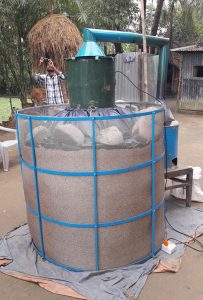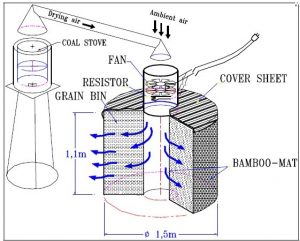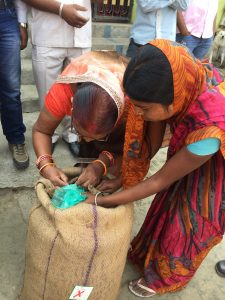ADMI-supported researchers in South Asia and the United States developed the ADMI Grain Handling System as an affordable and scalable postharvest loss (PHL) prevention strategy in India and Bangladesh. High moisture content is a leading cause of PHL in smallholder farmers’ stored grains. Traditional sun drying by spreading grain on the ground is labor intensive, exposes grain to losses and damage, and can be undermined by untimely rain. Traditional methods of storing grain in permeable conditioners lead to rising moisture content with changes in weather and expose grain to pest damage.

The STR dryer as adapted in Bangladesh.

Original STR dryer schematic developed in Vietnam.
The ADMI Grain Handling System combines a small-scale grain dryer with hermetic bags to make improved drying and storage available to smallholder farmers.
- Research findings show that the system can:
- Reduce volume loss over 5 months from 1.5% to zero using traditional methods.
- Reduce insect infestation after 5 months from more than 800 insects per kg of grain to zero.
- Maintain moisture content at less than 12% through the rainy season, while moisture content rises to over 20% in a traditional system. Evidence shows this difference in moisture content can dramatically affect mycotoxin contamination rates.
- About 95% of intervention farmers produced their own seed using a hermetic bag, and about 20% of farmers sold remaining seed to a neighbor.
The grain dryers, inspired by the STR dryer developed in Vietnam (Original schematic drawing above), are adapted for local conditions in India and Bangladesh. Each dryer has a half-ton capacity and decreases moisture levels from 20% to 12% in 4 hours.
Download and/or view the PDF with more details of the dryer with modifications by Bangladesh Agricultural University here.

Women in Bihar, India, seal grain in a hermetic storage bag inside a traditional jute bag.
Hermetic bags are a proven technology, but are not widely used in South Asia and only achieve optimal impact when combined with properly-dried grain. The results show that the system enables farmers to keep corn, wheat, and rice at appropriate moisture content for safe storage, can eliminate pest damage, and can prevent aflatoxin emergence in stored grain. The system is also economical.
A Bangladeshi farmer drying her own grain and providing drying services for a fee to neighbors can recover the cost of investing in a dryer in 2 years. Hermetic bags pay for themselves if they are re-used over multiple seasons. The return on investment is even greater if farmers receive a quality premium in the market for well-stored cereal grains.
ADMI has expanded the reach of this system in Bangladesh through a partnership with Kansas State University and Bangladesh Agricultural University in the USAID Feed the Future Innovation Lab for the Reduction of Post-Harvest Loss (PHLIL). Partners at Bihar Agricultural University, Dr. Rajendra Prasad Central Agricultural University, and the Borlaug Institute of South Asia are helping adapt and disseminate the system in the state of Bihar, India.

